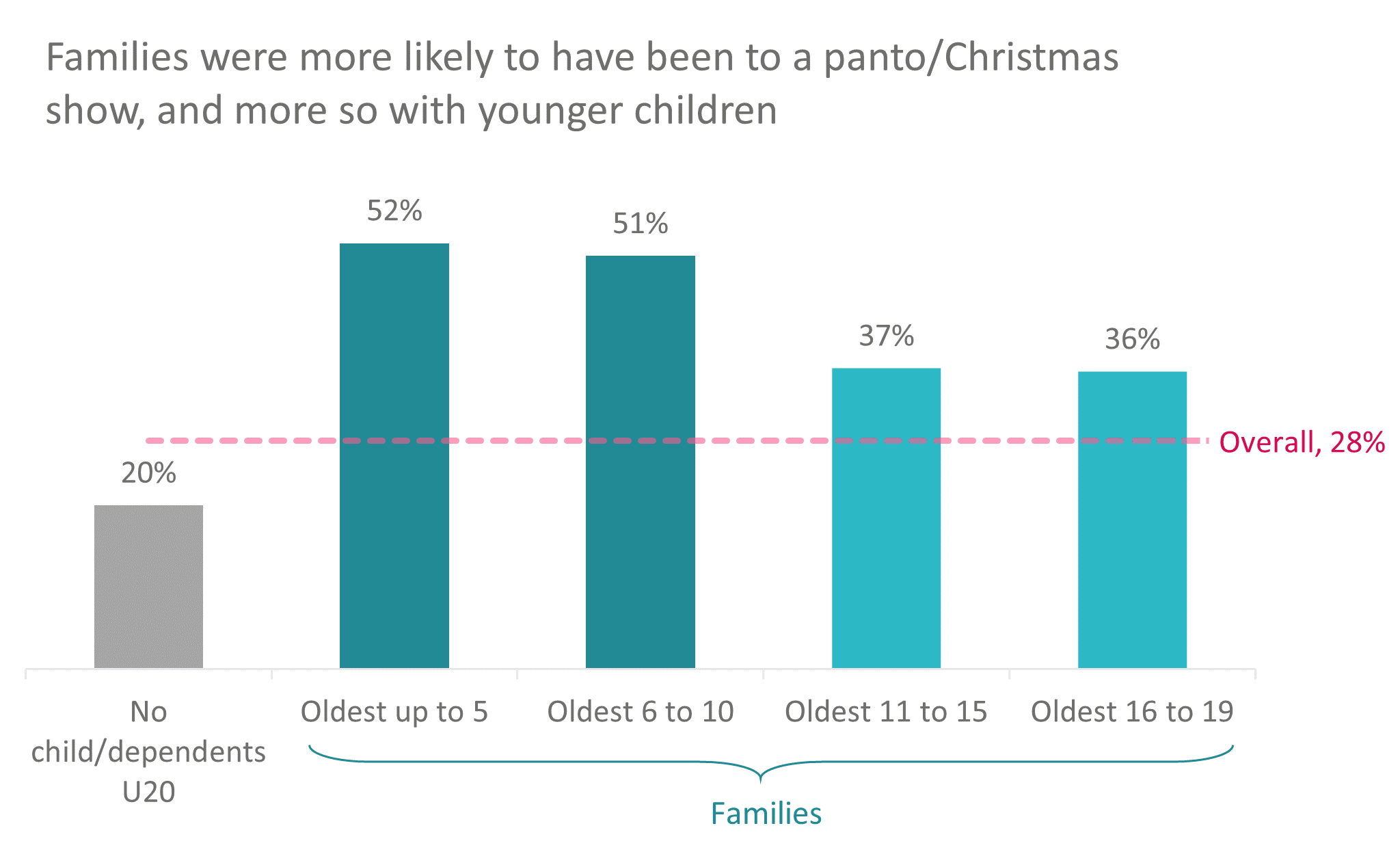Late booking trends
March 2023
This research is from The Audience Agency's nationwide longitudinal (ongoing) panel survey of changing views about participating in creative and cultural activities through the recent and ongoing crises, and beyond, the Cultural Participation Monitor.
Contents
Themes
Panto season pre-sales stand out as being back on track, though this goes against an overall trend towards later booking, with over 40% saying that they now tend to book more last minute than they used to.
Panto Season Pre-Booking
Bookings for pantos and Christmas shows have returned to pre-pandemic levels, led by 25-44 year-olds, particularly those with young children, with pre-booking dominated by groups least affected by cost-of-living concerns.
- Bookings to pantos and Christmas shows seem to be back to pre-Covid levels. We have seen this in our (forthcoming) ‘Change Analysis’ of booking data, but also in these survey responses.
- 28% of respondents said that they had attended a panto or Christmas show at a theatre in the last panto season.
- This was, of course, higher for 25-34s and 35-44s (35% and 37%) and those with children (48%), particularly where the oldest children were under 5 (52%) or 6-10 (51%). It isn’t an exact comparison, but in October 2021, 13% said that they had booked a panto or Christmas show for the forthcoming panto season.

- Attending panto was very much something done by families who were feeling better off (72%, cf. 48% for worse off [NB small samples]), with families’ financial situation much more indicative than perceived Covid risk, for example.
- We can also see from the Change Analysis that the profile of panto bookers has continued to change, with more Dormitory Dependables and Trips & Treats and fewer highly engaged groups and Home & Heritage.
- This continues a pre-Covid trend, with panto attendance being more concentrated among particular sections of the population (which appears to be middle-engaged, financially-secure, nuclear families).
Late Booking Trends
40% now tend to book for arts and culture events more last-minute than they did pre-pandemic, regardless of financial situation, representing a major shift in purchasing patterns, especially in younger (pre-retirement age) audiences.
- Venues have reported higher levels of late booking since the pandemic, and this is confirmed by respondents. 9% ‘strongly agree’ that ‘I tend to book more last minute than I used to before the pandemic’ and a further 32% ‘agree’.
- With 1/4 reporting booking later, this reflects a major shift in behaviour.
- Interestingly, this was true of both those who felt better off than before and those who felt worse off than before, suggesting that there may be different types of motivations driving the same pattern of behaviour (e.g. some feeling better able to spontaneously ‘treat’ themselves, with others more likely to ‘hold off’ from purchasing).

- Late booking, of course, tends to be a self-reinforcing pattern; If events aren’t expected to sell out early, there is less incentive to book early, which therefore makes them less likely to sell out early.
- Those over 65 were less likely to report later booking.
Related videos
TEA Break | Following Arts and Cultural Organisations on Social Media
Watch nowCultural Participation Monitor | Latest Findings on Audience Attitude and Behaviours
Watch nowOther findings from Wave 8 | Mar 2023 | Cost of Living, social media, support for organisations
-
Cost of living outweighs covid
Over 60% say that the cost-of-living is already slashing their ability to attend culture events (more than twice than because of Covid concerns), with even higher numbers expecting this to still be the case in 6-24 months' time.
-
Engagement trends
1/3 still report attending arts and culture less than pre-pandemic, though under 35-year-olds are returning more than others, and are more likely to identify as the 'initiators' of social cultural activity with friends and family.
-
Social media behaviour
More than 1/3 people say they follow an 'arts and culture' organisation on social media, though report being more inclined to do so out of interest in the broad topic or artform, than in that specific organisation and its events.
